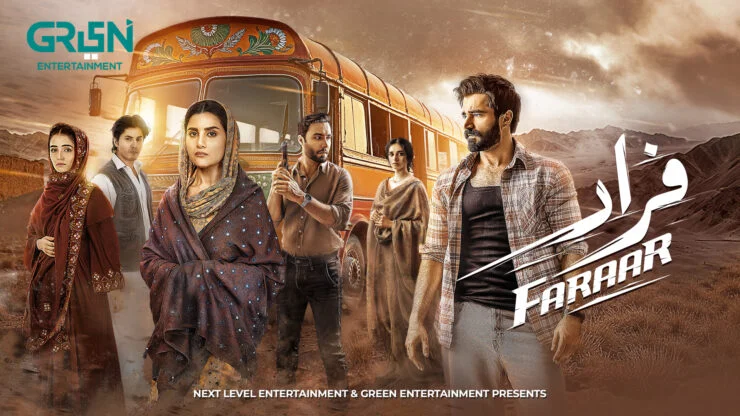Cast: Hamza Ali Abbasi, Sohai Ali Abro, Nadia Jamil, Ahmed Ali Akbar and Danyal Zafar.
Themes: justice, honour, and the pursuit of redemption.

The characters of Green’s new crime drama are morally messy:
Fasih, a suspended cop with a strong sense of justice,
Batish, the shady guy on a love-and-crime spree and,
Barbrik Khan a charming Pashtun who seems easy-going but has a fiery side.
From Karachi’s chaotic streets, Lahore’s dark alleys to the picturesque valleys of Swabi Faraar leaves you asking: who’s the good guy, really?
Spoiler: It’s not as obvious as the hero’s leather jacket.
Faraar’s characters, with their overlapping moralities and personal demons, drive the narrative forward, and the show’s unapologetic portrayal of corruption and justice challenges viewers to question the line between right and wrong.
The series kicks off with a pulse-pounding dive into Karachi’s bustling cityscape, where Fasi, (Ahmed Ali Akbar) is promptly confronted by two gun-wielding robbers on a motorbike. Fasi’s calm demeanor screams ‘been there, done that’- and, oh, he’s got a gun of his own! The situation is diffused with ease… such is the ‘thug life’.
As a Karachiite, I wondered ‘where is the crowd?’
In a city where rubbernecking is an Olympic sport, it’s astonishing that Fasih’s heroic stunt goes unnoticed. He’s taking down robbers single-handedly while casually discussing marriage proposals with his mom on the phone, (talk about multitasking) and nobody is there to capture it all?
We soon realize the gun Fasih wields isn’t just a tool for intimidation; it’s a badge of his profession. As a police officer suspended for offending an MPA, Fasih visits his old station and faces a corrupt colleague whose hostile interrogation highlights Fasi’s unwavering sense of justice – a trait that clearly sets him apart in a system mired in corruption.

As the series unfolds, we are introduced to Batish (Hamza Ali Abbasi) whose simmering intensity hides a dark secret. Like Fasih, he rides into the scene on a motorbike which sets the tone for a brooding hero. But what’s this? Does Batish have a secret passion for birdwatching ? Well no, just watching a particular lady every day. Here we meet Sadia (Mamiya Shajaffar) who exudes confidence and self-assurance. We also learn that paan walas can act like agony aunts and school you on your love life.
Batish’s potential love interest, Sadia, is revealed to be the daughter of Professor Hamdani ( Noorul Hassan) an advocate for fighting against injustice. Armed with nothing but a pen and an unyielding commitment to justice, Hamdani is hell bent on exposing the shady and fraudulent activities of Shah Sahab (Mehmood Aslam) a crooked politician with a battalion of minions. Shah Sahab is not happy about our Professor Hamdani’s interest in him and sends a warning but unsurprisingly, Hamdani doesn’t back down.
This is where the murky moral territory is explored brilliantly.
Batish does what Fasih cannot—while one upholds the law, the other breaks it with ruthless precision. Batish works for Shah Sahab’s political party and is assigned the task of eliminating Hamdani. As he navigates the deadly game of political maneuvering, Batish’s internal conflict grows, torn between his love for Sadia and the violence of his mission. Will his past sins continue to haunt him, or can he escape the shadow of his legacy?
How does one say, “I killed your father, but I swear my love for you is true?”
Meanwhile, we meet Barbrik Khan (Danyal Zafar), a stark contrast to the brooding Batish and the heroic Fasih. Barbrik exudes a relaxed, warm energy and has a passion for archery, offering a refreshing shift in tone amid the morally gray characters we’ve encountered so far. But he is too is complex. He struggles with family expectations and a violent outburst that threatens to alter his future. In a pivotal scene, Barbrik shows he can accept defeat graciously, but when a lewd comment triggers his temper, he bites his opponent’s ear off. This unpredictable behavior raises concerns, particularly from his paternal uncle and future father-in-law, who are both alarmed by his volatility.
As we traverse the landscape of Pakistan, we reach the cultural hub of Lahore. Here Faraar takes a dark turn as it plunges into brutality and chaos. Shakeela (Nadia Jamil) takes the phrase ‘Hell hath no fury like a woman’s scorned’, to its extreme. She unleashes this fury upon Nazish (Sohai Ali Abro) in a shocking display of violence.
We discover that Shakeela’s brother played by Hassan Niazi is the real puppet master…a ruthless and dominating figure who wields power with an iron fist. The contrast of his brutal acts with scenes of him offering prayers adds a layer of complexity to his persona. The interplay between personal vengeance and societal oppression sets the stage for the larger conflicts that will unfold.
While the thrill and impact of this drama are undeniable, there are moments when realism takes a backseat—like the scene where Nazish drinks acid. Meanwhile, my 7-year-old niece screams bloody murder after eating a slightly hot bite of daal chawal, yet Nazish survives the acid and lives to tell the tale!
So far, morally tangled characters and high-stakes drama, make Faraar a rollercoaster of twists, tension, and revelations that will keep you guessing until the very end.
Faraar is on air every Sunday at 8 pm on Green Entertainment





 After many unfor
After many unfor


 Watch our full
Watch our full 






